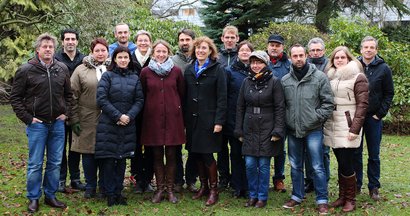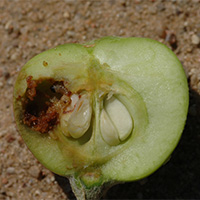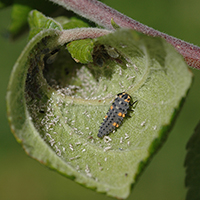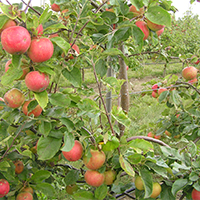EcoOrchard
Pest management in organic apple orchards - increasing functional agricultural biodiversity
Background
Organic tree fruit quality and yield are often reduced (10 - >80%) because of insect and pest damage. No effective control measures exist for many of these pests. This increases economic risk and can reduce growers’ motivation to develop organic production. At the same time, there is a large potential for organic apple production as consumers become increasingly interested in organic food.
Main project activities
1. To identify promising techniques, tools and monitoring protocols to improve management of functional biodiversity, which consistently enhance the performance of natural enemies, reduce pest pressure and are adapted to farmers' implementation.
2. To assess promising techniques, namely specific flora introduction to provide and optimize supplementary alternative food/prey for natural enemies, and specifically adapted habitat management.
3. To create a European-wide network of stakeholders for collecting, sharing and improving scientific and practical knowledge and experience in functional biodiversity management for resilient organic orchards.
4. To learn from a participatory approach about potential constraints that may hamper the adoption of innovative tools and how to solve these constraints by iterative re-evaluation.
Benefits and results
Expected societal benefits of the project
In order to achieve the environmental goals of the EU and to meet the objective of food security, the development of low impact strategies for pest management with a long-term sustainability is essential.
Overall, functional biodiversity contributes 1) to increase the economic resilience of apple production for growers by reducing pest losses and promoting clean and environmentally friendly products (such as safe, unpeeled fruits), 2) to improve the community welfare through a pesticide-free environment and the promotion of biodiversity, and 3) to provide the market with a more stable production of high quality organic apples.
In addition, the reinforcement of local plant diversity (within and around orchards) usually involves a significant positive change to the landscape. It can also favour other wildlife such as birds and it produces increased aesthetic value, which in turn can promote ecotourism in certain regions.
Expected outcomes, results and impact
The organic fruit sector will obtain a European-wide stakeholder platform which delivers scientifically and technically proved information on how to establish and manage more resilient orchards.
Management of existing and design of future orchards will be supported by simple protocols for the establishment and monitoring of functional biodiversity elements that are suitable for wide adoption in different European countries.
A novel, functional biodiversity system that can be adopted into existing orchards will be tested and validated for both, (i) its effect on pest control and pesticide reduction and (ii) on its practical feasibility across 6 European countries.
Expected long-term impact
Application of FAB measures will make orchards more robust, reducing the need and input of direct control, and increase the overall on-farm biodiversity for the benefit of growers, consumers and the environment on a wide European scale.
How to reach target groups
The project will collaborate with farmers and extension services to ensure that methods meet end-users needs and constraints. In addition, with the dissemination of results in relevant journals and other communications channels the target group will be met.
Project partners
Lene Sigsgaard, University of Copenhagen, Denmark
Dorota Kruczyńska, Małgorzata Sekrecka, InHort, Poland
Lukas Pfiffner, Fabian Cahenzly, Claudia Daniel FiBL, Switzerland
Marc Tchamitchian, Servane Penvern, Aurélie Cardona, Arnaud Dufils, Ecodéveloppement, INRA, France
François Warlop, GRAB, France
Annette Herz, Julius Kühn-Institut, Germany
Mario Porcel, SLU, Sweden
Markus Kelderer, Josef Telfser, VZ-Laimburg, Italy
Laura Ozolina-Pole, Baiba Ralle, Latvian Plant Protection Research Centre, Latvia
Laurent Jamar, CRA-W, Belgium
Maren Korsgaard, EcoAdvice, Denmark
More information about EcoOrchard
Read more about the project at www.plen.ku.dk

The project EcoOrchard is funded by ERA-Net CORE Organic Plus Funding Bodies partners of the European Union’s FP7 research and innovation programme under the grant agreement No. 618107.




